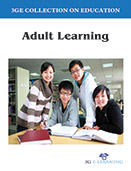Education and Psychology

In today’s fast-paced world, adults have to juggle demanding jobs, family responsibilities, and community commitments. Adults have special needs and requirements as learners. Adult education usually refers to any form of learning undertaken by or provided for mature men and women outside the formal school system. The main targets are specifically defined as youth as well as women and men, generally poor or socially disadvantaged. Although literacy continues to be at its heart, adult education also includes “numeracy”, problem-solving and life skills, and other knowledge. The notion of adult education is often used interchangeably with other notions such as literacy, adult basic education, lifelong learning, continuing, adult basic end non-formal education, etc. Even if they are highly motivated to learn, the pressures of life often limit the time many adults can invest in learning. Therefore, in many cases, learning must be available when it is convenient for the learner and delivered in “manageable chunks.” These may come in the form of modularized e-Learning programs, podcasts, or webcasts or may be strategically delivered through informal training initiatives. A comprehensive understanding of adult learning principles is critical to developing successful education programs that result in participant engagement and the facilitation of learning.
This book entitled “Adult Learning” is intended for students and teachers in adult literacy community. The book focuses on a teaching-learning continuum, one end of which is directed learning and at the other, facilitated learning. The main point raised and discussed throughout the book is that adult learning is highly individualistic and fluid. The book summarizes foundational learning theories and then examines the more recent breakthrough theories of adult learning such as andragogy and transformative learning.
The role of adult education in national development is multi-dimensional. Indeed, as are of the building blocks of human development, and not just a basic right, education, including adult education, is a foundation for progress in areas such as human capital, health, nutrition and the development of institutions and democracy. Therefore, the role of adult education in development can be apprehended through the complex relationships existing between all its forms and the economic, political, social and cultural factors. The economic role of adult education in development is apparent in its contribution to human capital formation.
As such, it requires that teachers be very flexible and utilize a range of teaching approaches and methods in order to enhance learning. The course of book looks at current adult learning theory, as it relates to the practice of adult education. It provides a blend of theory and practice with some ideas for dealing with the myriad of factors that influence adult learning. Intended for learning and performance professionals, Adult Learning addresses individual learning competencies, learning climate, and technology-related issues as they affect adult learning in the workplace.